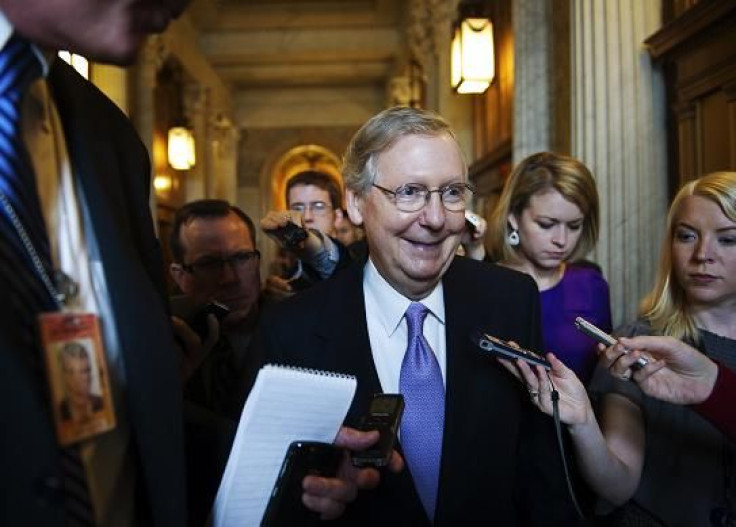Fiscal Cliff 2013: Investors Have One Eye On US Senate, One Eye On US House

With U.S. Senate leaders moving closer to a bipartisan budget deal to avert the fiscal cliff, the focus of attention leaned Sunday toward perhaps the biggest unknown in Washington’s current budget drama – the U.S. House of Representatives.
The Senate is working on a bill that would increase income tax rates for upper-income adults, with the chief sticking point being the threshold, The New York Times reported Sunday. President Barack Obama and Senate Democrats want rates to rise on incomes over $250,000; Senate Republicans want a higher threshold, perhaps at $400,000.
Senate Democrats and Republicans are also divided on the estate tax, which currently taxes estates over $5 million at 35 percent. Without a budget deal, the tax increases to 55 percent on estates over just $1 million.
Boehner's Burden
Assuming the Senate can produce a bipartisan bill, House Speaker John Boehner, R-Ohio, will then face perhaps the biggest dilemma of his leadership of the lower chamber: whether to try to lobby a deal through his free-spirited, Tea Party-faction dominated House Republican caucus – or hold firm against tax rate increases that a bipartisan Senate bill is likely to contain.
If Boehner lobbies for the bill, the fiscal cliff will be averted, but he will likely lose support in his House GOP caucus, and there is a better-than-decent chance the extremely conservative Tea Party faction will attempt to remove him as speaker.
On the other hand, if Boehner refuses to compromise and holds firm against any bipartisan Senate bill that contains a tax increase – one rooted in higher income tax rates or other tax increases – he’ll most likely retain the support of the Tea Party faction and other conservatives, but the United States will have fallen over the fiscal cliff – with large, negative consequences for
the U.S. economy and domestic and global financial markets.
Markets Likely To Respond Negatively To A Lack Of A Deal
Under the latter scenario, stock, bond and currency markets will likely react negatively to the inability of the U.S. Congress to forge a plan to enable the nation to pay its bills.
In August 2011, the last time Congress failed to signal to the markets that there would be no interruption in the nation’s bill paying – including its bond payments – stock and bond markets plunged. Congress’ failure to raise the U.S. debt ceiling – triggered by initial Tea Party opposition in the House – led to a 635-point plunge in the Dow Jones Industrial Average and the unthinkable: a credit downgrade of U.S. debt by a major credit rating agency, Standard & Poor’s.
And as the nation lurched, yet again, toward another fiscal deadline, institutional investors -- and the typical person, for that matter – adopted stances ranging from disbelief, to exasperation, to anger over Congress’ inability to avoid the imminently avoidable: a politically-induced shockwave to financial markets and the economy. Investors outside the beltway are apoplectic because – regardless of whether one favors primarily spending cuts or tax increases to put the nation on a sound fiscal track – the world’ largest and most technologically advanced economy contains the resources to pay its bills – if the two major political parties find common ground, and compromise on those issues where there is a substantial difference in policy.
Meanwhile, as the Senate continued to work Sunday to forge a bipartisan deal, federal government departments and agencies prepared for a possible $110 billion reduction in programs – sequestration – with half the cuts occurring in defense programs, half in non-defense.
Also, the Obama administration’s back-up plan remained unchanged. President Obama has said that if the Senate negotiations breakdown and the upper chamber cannot produce a new budget deal, he wants the Senate to schedule an up-or-down vote on his measure that would maintain the Bush income tax cuts on middle-income adults, and also maintain extended unemployment compensation benefits.
An estimated 2 million adults will lose unemployment benefits by Jan. 1, if a budget deal is not signed into law. That would slow the sluggish U.S. economy, almost all economists agree, as money from the compensation benefit typically is quickly spent on housing, food, utilities and other basic monthly expenses.
© Copyright IBTimes 2024. All rights reserved.











